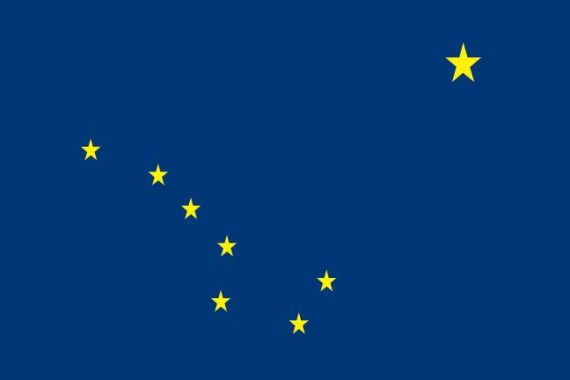More Alaskan Politics
And thoughts on party systems more generally.

Last week I noticed the following from the Anchorage Daily News: 9 Democrats and 8 Republicans form bipartisan majority in Alaska Senate.
All nine Democrats and eight of the 11 Republicans elected to the Alaska Senate are forming a bipartisan majority coalition, they said Friday, just two days after the deadline for Alaska election officials to receive ballots and before the election results have been certified.
The coalition will bring together 17 senators, leaving three right-wing Republicans in the minority, coalition members told reporters Friday evening in Anchorage.
Bipartisan coalitions — a rarity in other parts of the country — have become a staple of the Alaska Legislature in recent years with disagreements over the state fiscal policy dividing Republicans. The Alaska House, currently controlled by a bipartisan coalition, has not yet organized.
This is fascinating to me because it suggests, alongside recent electoral outcomes in the state, that the cleavages exist for at least a three party system in Alaska but the incentive structure of the electoral system keeps that party system limited to the existing two containers. Put another way, there is enough evidence of divergences within the Republican electorate to suggest distinct factions that in another electoral system would have led to the creation of a new party.
An obvious point in time for such a move in recent memory would be when Senator Murkowski was denied the Republican nomination and had to run as a write-in candidate to achieve re-election. In most party systems such a circumstance would very likely have led to the creation of a new party label. But in the US the two mainline labels are so entrenched and valuable, it is hard to incentivize new party formation (especially since stopping a candidate from using them is almost impossible).
The legislative activity in the linked piece underscores that there is clearly ongoing division in the Republican Party of Alaska, but again, the label is clearly perceived as too valuable to give up.
After all, if people come to your restaurant because it is called “McDonald’s” you are going to be hesitant to change the name even if you aren’t quite offering the same menu as the other McDonald’s in town.
Fundamentally, I think it boils down to control party labels (or really, lack thereof). There simply is no centralized control over who can be called “Republican” and since there are automatic votes to garnered via that label, multiple people will want to use it.
The old system of primaries nominating candidates and therefore limited use of that label in general elections simply meant that the “Republican” on the general election ballot might be part of the R1 faction or the R2 faction. Now with the Top Four system R1 and R2 can both make it to the general. However, it is worth noting that they aren’t called R1 and R2 on the ballot, but instead are just Republican and Republican (and maybe also Republican).
Under such circumstances, the voter may not fully understand what they are getting because the signaling mechanism that party label is supposed to perform is muddled. Indeed, let me stress that a major function of party labels, from an electoral point of view, is a signaling device to voters. If more than one candidate can use the same label, that rather obviously confuses the signal.
A voter knows that they are a Republican, and perhaps of the R1 variety, but when they see a bunch of names with “Republican” by them on the ballot, they may or may not know if those are R1s or R2 (or even some weirdo R3s).
So, why not split into an R1 Party and an R2 Party and put clear names on it? Because the understandable fear by politicians is that voters simply won’t go along with the change, so why risk it if they don’t have to?
In most representative democracies there is some level (often significant) of control over party labels so that only people who will, to return to the burger analogy, adhere to the rules of a given franchise will be allowed to use a given label. You can’t say you are a McDonald’s but then serve up Whoppers.
But If I can get away with using an established label, and therefore be almost guaranteed some slice of the electorate (not to mention being treated as part of a “normal” party instead as some oddity) then I am going to stick with using that label and relying on whatever amount support that gives me rather than risk creating something new. (And this is all reinforced by the deeply nationalized nature of our parties).
This will be true even if, as the case appears to be in Alaska, both electoral and legislative behavior suggest that more parties should form.
I would note that if under Alaska’s Top Four there was a limitation* on how many candidates a given party could nominate, then I would expect new parties to form, and pronto.
*Such a limitation could be statutory or it could be imposed by the existing parties.





It does seem that the difference between the typical R pol and the typical Dem pol in Alaska is much closer in their views on issues than is found elsewhere in the country. Even without a formal coalition, the 8 R’s could have frozen out the 3 RW’s and looked to pick off a couple of Dems on an ad hoc basis depending on the issue.
I wrote something about this in the Dec. 1 open forum at 13:35.
I repeat it here:
I found a really curious piece over at Martin Longman’s place. It’s paywalled though.
It will be hard to post only excerpts and yet have it to make sense, but I’ll try:
https://progresspond.com/2022/11/30/why-the-u-s-house-should-emulate-the-alaska-senate/
snip
snip
snip
@charon:
So it seems the political scientist (Taylor) and the political pundit (Longman) put a significantly different spin on the Alaska situation.
@charon:
I suspect Dr T, being the academic, sees this as it is and Longman, the Pundit sees it as he wishes it was in a different venue. I find that Alaska, not following the partisan norm interesting and wonder why?
When Biden started openly talking about MAGA extremists I thought it was a political mistake. But as things develop, it appears to have been brilliant. Apparently there are more Rs than I thought who don’t want to think of themselves as MAGA extremists. Alaska would seem to be a data point that there are GOPs who want to separate from the MAGA so they can govern and probably so they can collect some cheddar.
I’ve complained about the supposedly liberal MSM’s desire to do Dems-in-Dissaray stories. Boy howdy, I’m seeing lots of GOPs in disarray. Top of the head:
– Ezra Klein did a good interview for NYT with Michael Brendan Dougherty, a National Review and AEI guy, on the hollowness of the Republicans. (Very good, but talking almost entirely about voters, ignoring funders and conservative media.)
– Over at WAPO David Van Drehle has a nice piece titled The GOP is stuck in a doom loop begun 30 years ago arguing Pat Buchanan and Newt Gingrich started their fall. (He’s wrong, it goes back at least to Goldwater.)
– Various pieces on the GOPs starting a new post-mortem staffed with the losers.
– Various pieces on McCarthy’s upcoming loss to something vague not named McCarthy.
– The Ye, Musk circus, which is mostly Trump, but maybe some GOPs can see it ain’t just Trump.
Everyone wants to apply Murc’s Law and demand that Ds somehow fix the GOP’s party for them. Maybe Biden started us down a path to do just that. GOPs have run on exciting the base at least since Rove said they’re all turnout elections now. Maybe some of them will see a path back from the brink toward a median voter strategy. DeUseless losing bigly would help. A boy can dream.
@charon: I think the likelihood of a centrist unity coalition in the House is very low.
I do think that McCarthy doesn’t have the votes lined up yet, and might be slaughtered by the Q caucus as a show of force.
But, accepting Dem votes (socialist groomer votes) in a coalition would be the kiss of death for a lot of Republican political careers.
(If enough Democrats don’t vote, they could save McCarthy — he needs a majority of the present and voting members, not 218 votes — but why would they do that?)
(True chaos would be the Democrats all voting for a Q caucus loon, but at that point we are in Air Bud “there’s no rule the Speaker can’t be a dog” territory)
@gVOR08:
This is what fascinates me about Herschel Walker’s candidacy. There is no way anyone in Georgia can think that Walker is the best candidate to champion Georgia’s interests, the one to bring home the bacon. Yet he is a created candidate, encouraged to run and funded by power brokers. I can only think that, at least with respect to the Republican Party, powerful people seem to think that it is unimportant who their senator is. Or, more likely, that the Senator who is most beneficial to them isn’t someone who will skillfully fight for their interests, but an easily manipulated and profoundly stupid clod with an “R” after his name. I’m not sure what to think about that. I assume they are right, But I don’t understand why.
@MarkedMan: Yeah. As has been discussed here endlessly, the Rs voted for Walker in the general because he has an R after his name. But he won a primary against people who also had Rs. We also talk a lot about parties not being able to control use of their name, but Walker didn’t walk off the street into a GA Sec O’State office and fill out the forms, he was recruited, financed, groomed, and endorsed by major players in the party.
Through Reagan, W, Palin, and Trump it’s seemed like what the R establishment needs is someone with a blue collar charisma (invisible to me) and naive enough to believe their bullshit. GOP players wanted Walker.
They cynically bet GA voters are dumb enough that Walker’s celebrity would overcome his obvious flaws. (And they all want to have a Black friend.) They may be right.
And he’s black. Between what Stacey Abrams accomplished in 2018 (and the years after) and Warnock’s victory over the perfect, pretty, blond, rich, white republican, they decided they needed somebody with more melanin in their skin. After all, they vote on the basis of skin color, so obviously black people do too.
Put to the lie by Norman’s very succinct observation in season 4 of The Wire, “Black people have been voting for white people forever.” (or something like that).
The thing that I suspect is not readily apparent to most people not in or from the 49th state is that everyone in Alaska understands that they are utterly dependent and relying on federal largeese and are determined to make sure they keep getting their slice of that fat hog
No edit button to add, but if that means supping with the devil, at least his kitchen is warm.
@Flat Earth Luddite: Amen.
@Flat Earth Luddite:
There’s also the dividend payments from the Permanent Fund. It’s not that much, but it’s the closest thing to a state-wide universal income.
So, hardcore Republican state that takes money from oil companies and distributes it to most residents? As the old cartoon robots said “does not compute.”
Theory about the source of the extra faction: the Alaska Permanent Fund dividend.
Alaska essentially has a UBI program, and I could imagine it creating a faction of rural people that would normally align Republican culturally, but that is more hostile to the “small government” rhetoric because they don’t want to lose their payments.
@charon: This is all just fantasy talk, unfortunately.
To my point about factions in AK politics, these politicians have made a calculation that they will not be punished at the ballot box for this coalition. This would simply not be the case for most GOP members of the House.